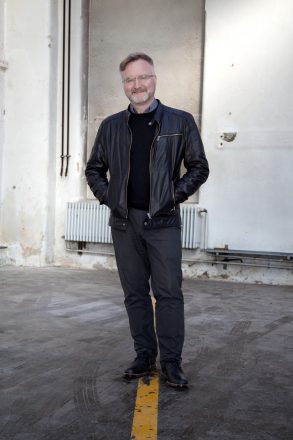Music, literature, art, film, design, games — the cultural and creative industries are multi-faceted. Cultural entrepreneurs and experts let us in on how the industries work.
Cultural and creative industries sounds like a contradiction in terms at first, with creativity on one side and its economic exploitation in markets on the other. The term “startup” inherently embodies both elements, explained Munich sociologist Armin Nassehi in his talk with the BR cultural TV program Capriccio:
“Startup means that you belong to a new class in society, namely to the creatives. That means you belong to a group that inherently rejects exactly what they are doing, namely developing a business.”
Nassehi sees startups as creative entrepreneurs against their own will. We spoke with some players in the creative industry: How does the scene itself see the relationship between cultural production, entrepreneurship and startups?
“The core motivation is the passion for creative work”
An individual who certainly would know is Jürgen Enninger, director of the Competence Team for Cultural and Creative Industries in the Bavarian capital Munich. The 48-year-old is known as a distinguished supporter of the creative industry in Germany, and also represents a nationwide support network as one of two spokespersons. In his position as Munich’s top patron of creative industries, Enninger also represents Europe’s second most important cultural and creative city.
We asked Enninger what distinguishes a cultural entrepreneur. Are they different from other startup founders?
“A classic cultural entrepreneur is someone who is passionate about some kind of creative work, but for one reason or another has not become an artist themselves.”

(© designliga – Landeshauptstadt München)
Yet because artists and creatives exploit their own artwork, the lines between being a cultural entrepreneur or artist are often blurred:
“The core motivation for many who are involved in the exploitation of culture is their passion for creative work. That often makes entrepreneurial endeavors difficult.”
Enninger’s comment reminds us of professor Nassehi’s words: creatives who are more passionate about culture than entrepreneurship. It is also due to a kind of reluctance to getting too involved in entrepreneurship in the cultural industries, added Enninger:
“Not many are primarily concerned with earning money and scaling business. They are content in a situation where exploitation maintains subsistence. Classic examples are music or book publishing houses that make the same amount of loss and profit and have zero in the end.”
The objective of many microenterprises that shape the sector is culture production itself. This makes them — without it being their intention — the economic force driving cultural work.
Mere enthusiasm or an economic factor?
Maurice Lausberg, Director of the Institute for Cultural Management and Media at the University for Music and Performing Arts Munich, named additional reasons for creative professionals’ reluctance to get involved in entrepreneurship:
“The market is often too small or offers very little growth, business models are often not scalable or not profitable, and often the marketing costs are too high in relation to the generated sales.”

The result is that the creative industries hardly have any large enterprises in accordance with a classic EU definition. Industry giants like Random House or Sony are, according to Jürgen Enninger, actually medium-sized enterprises. SMEs in the creative industries, where the majority of value is created, most often comprise three to ten employees. They are joined by an army of freelancers who work in a network on projects for the microenterprises.
The fragmentation of the industry and its sometimes anti-entrepreneurial self-image are also why the true economic significance of the industry has been overlooked for so long. In a sense, the enthusiast-industry has turned into a serious economic sector behind the backs and against the will of its players. It comes then as no surprise that a report caused quite a stir last year: nearly 10% of all self-employed persons and companies in the metropolitan area of Munich work in the cultural and creative industries. The creative sector accounts for 3.8% of Munich’s economic strength — astonishing dimensions for a sector viewed by many as trivial and merely for enthusiasts.
The “good things” in digital form
Being enthusiastic about culture is indeed what motivates the creative startup scene. The most important thing for the majority is not rapid scaling, market dominance or success; it is more about the thing itself. We wanted to know which subjects Jürgen Enninger currently finds most fascinating:
“Going digital always provokes going back to high-quality analog technology — a major countermovement is currently taking place: as an example, classic book trade is going extremely well at the moment. There has also been a dramatic increase in vinyl sales. Analog marketing is also a hot business topic right now.”
A retro retailer has been advertising for years with the slogan “The good things in life still exist.” The demand for good things seems to be increasing rather than decreasing in the digital age:
“That is why Bohème is so interesting to me, because that is exactly what they offer: there I am in a café, and they provide a classic line-up of newspapers, but in a whole new form.”
“In retrospect, founding a company was not difficult at all”
The startup just mentioned, Bohème, has made it their goal to translate Viennese coffee house culture — which one of the three founders, Amadeo Gaigl, told us is part of the world’s cultural heritage — into the digital age. In the Bohème app, users in participating cafés, shops, bars and trains have access to licensed media: instead of reading on old-fashioned wooden newspaper holders, now you can read on your own phone while at the café. What motivates the three founders, added Gaigl, is their passion for high-quality journalism:
“People need access to a lot more exciting journalistic stories, because those stories are much more effective in helping people understand the world than the clamor that has taken over much of the internet.”
But why didn’t the Bohème founders become journalists themselves? They simply didn’t have the skills — hence their path into the cultural industry. Gaigl does not see any substantial difference between young “cultural” companies and other startups. An immense amount of mutual support is also provided.

What is striking is that Bohème’s cultural startup founders seem to firmly believe in their mission. The story of how the company was founded fits right in. Gaigl had already been friends with his allies, Mohsen Fazeliniaki and Vincenzo Di Salvo, for years. The concept for the app was not created on paper, but rather in the Viennese Café Sperl.
After founding the company, there were naturally some difficulties, shared Gaigl. As an example, they had no idea how to complete an annual financial statement. If a problem arose, they simply dealt with it step-by-step:
“In retrospect, that is why founding a company was not difficult at all.”
It was also helpful for them to be located in Munich:
“As a key media location, Munich is a good market for us. Also for me as a Munich native, my personal network was a key factor. The proximity to Switzerland and Austria is also a major advantage in the German-speaking market.”
What the young entrepreneurs would like more of in Munich: increased exchange between startups, creative professionals and artists — perhaps in the form of a platform that brings stage actors and IT developers together over a cup of coffee, because:
“I think, in the early stages in particular, creative elements have an immense influence on startups.”
That might also be what makes the industry so special: For so many founders, it is not so much about their own individual success, but is more about spending quality time with interesting people, sharing experience and promoting their ideas. That makes it all the better when creative businesses are also economically successful.



